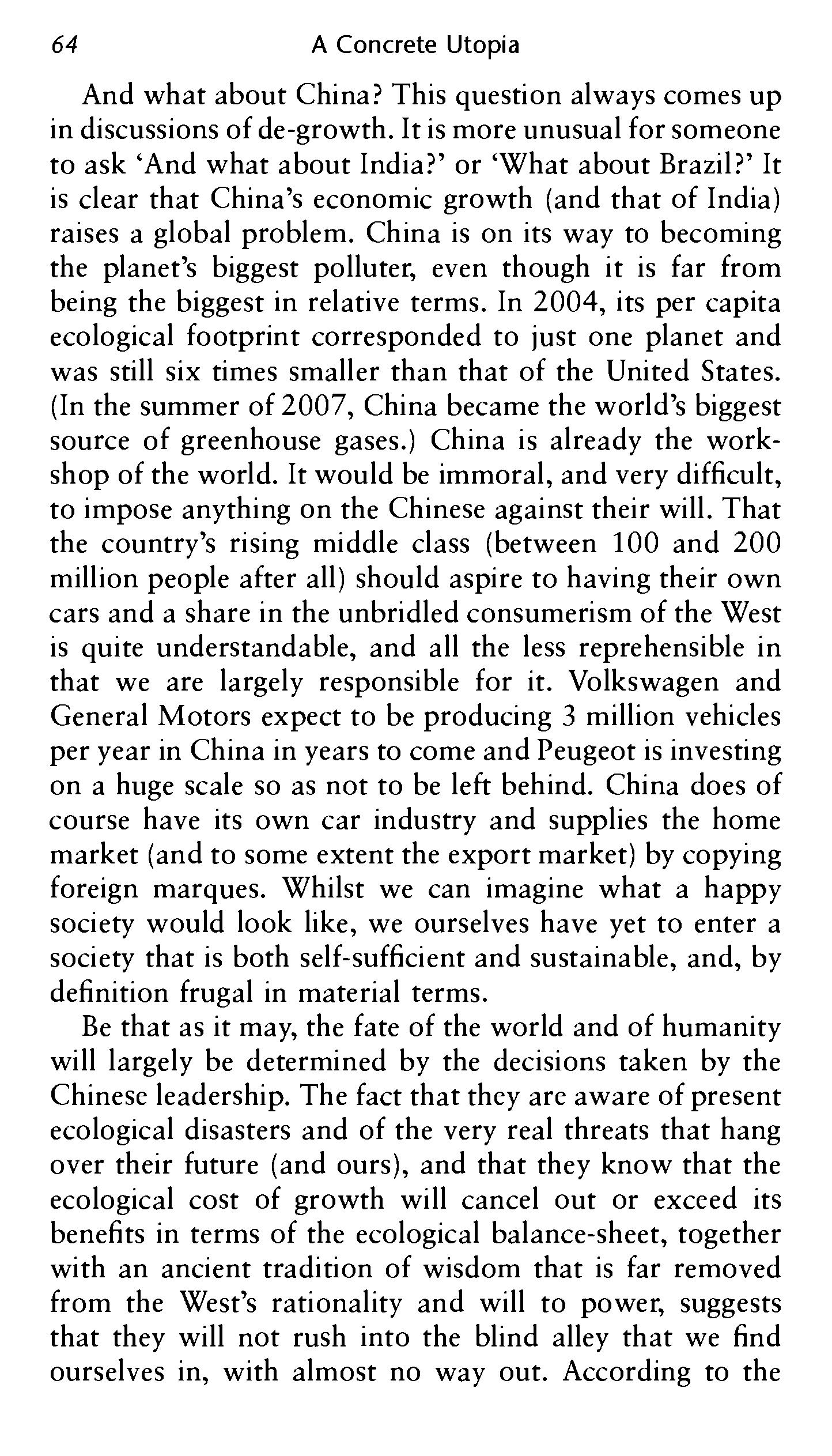
22 minute read
Is Reducing Growth a Retrograde Step?
green spaces have been developed, support has been given to local farmers and small shopkeepers. The commune has rejected the advances of property speculators and super- markets, and has avoided the 'suburbanization' that would have been seen as inevitable thirty years ago. The annual literary festival is a vibrant symbol of its new vivacity.
As Yves Cochet has suggested (2005: 224), the WTO should be replaced by a WLO (World Localization Organization), and its slogan should be 'Global protection for the local'.
Is Reducing Growth a Retrograde Step?
When it is possible, beating a retreat is, in some domains, a sign of wisdom. Especially when it comes to food sup- plies. In the OECD countries, the current trend is for food that it less local, less seasonal, less reliant on vegetables, and less expensive. And yet in recent years, the regions of France have become more food-dependent. Take the example of Limousin, which is regarded as a rural region. According to Emmanuel Bailly (2006), only 10% of all food is produced and processed locally. 'Almost no pota- toes are now grown, and the surface area devoted to the crop has fallen from 7,400 hectares to about 300 hect- ares. . . . In 1970, almost 6,300 hectares were devoted to growing vegetables; the figure for 2000 was 300 hectares (6,700 tonnes). Regional production meets only 8.1% of the population's demand for fresh vegetables.' Limousin's golden delicious apples now have to face competition from Chinese apples that are twice as cheap, shipping costs included! And before long, local beef will have to face competition from beef on the hoof from South America. That is already happening with packaged meat. Produc- tion has been delocalized by the shareholders in the big chains, which are supplied by purchasing departments that buy from outside the region. These practices are making the system very fragile. When the seamen's strike called by
the Société Nationale Maritime Corse Méditerranéc block- aded Corsica in October 2005, the island began to run Out of supplies of vegetables and fresh produce after four to five days.
Whilst they border on the caricatural, the travels of Danish prawns are not, unfortunately, exceptional. They go to Morocco to be peeled and then back to Denmark before being sent to market. What is, if possible, still more aberrational is that Scottish langoustines are expatriated to Thailand to be peeled by hand in a Findus factory and then returned to Scotland to be cooked before being sold in Marks and Spencer's stores. Reversing this trend would reduce wastage and would make our supply chains, and especially the food chain, less vulnerable to the rising cost of energy and the growing shortage of hydrocarbons (Cochet 2005: 97). According to Yves Cochet (2005: 89), the outcome would be 'food supplies that use less energy and reverse three current trends: supplies would be more local, more seasonal and more dependent upon vegeta- bles'. They will remain 'more expensive' if we go on making the victims pay and subsidizing the polluters.
Once again, a certain decolonization of the imaginary is required. Whilst they do not necessarily worship prog- ress and modernity (which we all do to some extent), 'decent people' are obsessed with a fear of going back- wards, which would mean poverty and humiliation for them. 'When I was a boy,' a Sicilian friend told me, 'I was the only one of my friends to have shoes. Everyone else played football barefoot. Nowadays, all the children have shoes. And we have growth to thank for that.' 'Objectors to growth' often clash with 'objectors to de-growth' who make similar comments, and there is no denying their validity. Their fear of being plunged back into a wretched past is, no matter how distorted their memories may be, quite legitimate. But no one is suggesting that we have to go back to that destitution, which was usually exacerbated by intolerable inequalities. We do, however, have to ask ourselves if the experience of well-being necessarily requires
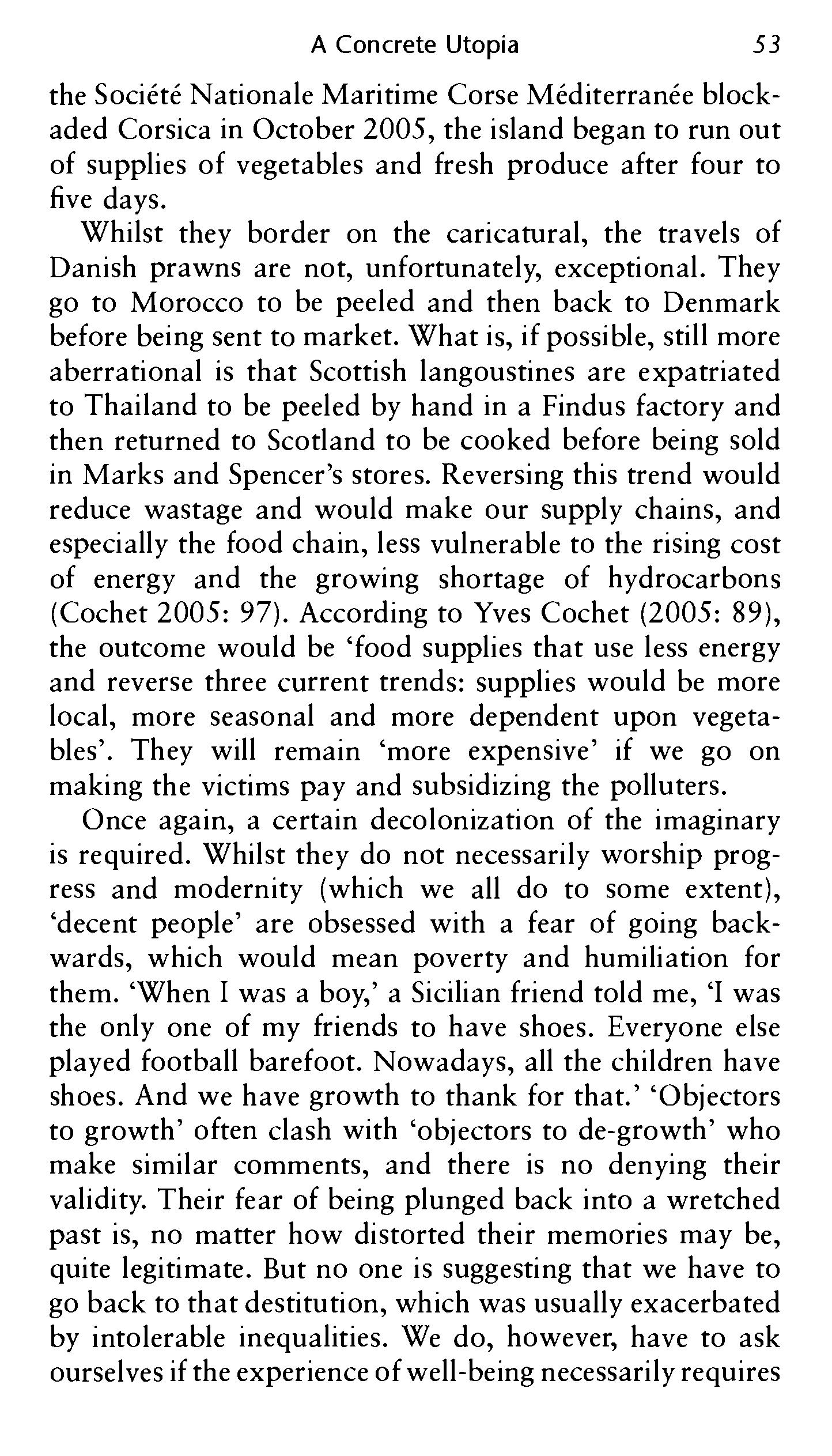
54
A Concrete Utopia us to have ten pairs of shoes, which are often of poor quality, rather than two pairs that will last. Murray Bookchkin (2001) rejects the suggestion that the good life requires us to have limitless personal material goods, and counters libertarians' imagined opposition to this infringe- ment of 'autonomy' by asserting that acceptable needs should be determined by the community as a whole.
Willem Hoogendijk (2003) tries to argue the case for the self-limitation of needs. According to the economics textbooks, there are no limits to our so-called 'needs', but Hoogendijk argues that a clearer distinction should be made between what Keynes called primary and secondary needs. There are naturally limits to the former, but not to the latter. Hoogendijk suggests that we make a distinction between basic or normal needs and other needs. The former (food, clothing, housing, work and sociability/sex) can become unreasonable (more space per person, more pairs of shoes, more central heating, etc.) but they are, in relative terms, subject to saturation. The latter are pro- moted by the growth society, which relies upon the dynam- ics of the endless creation of needs, and can be classified
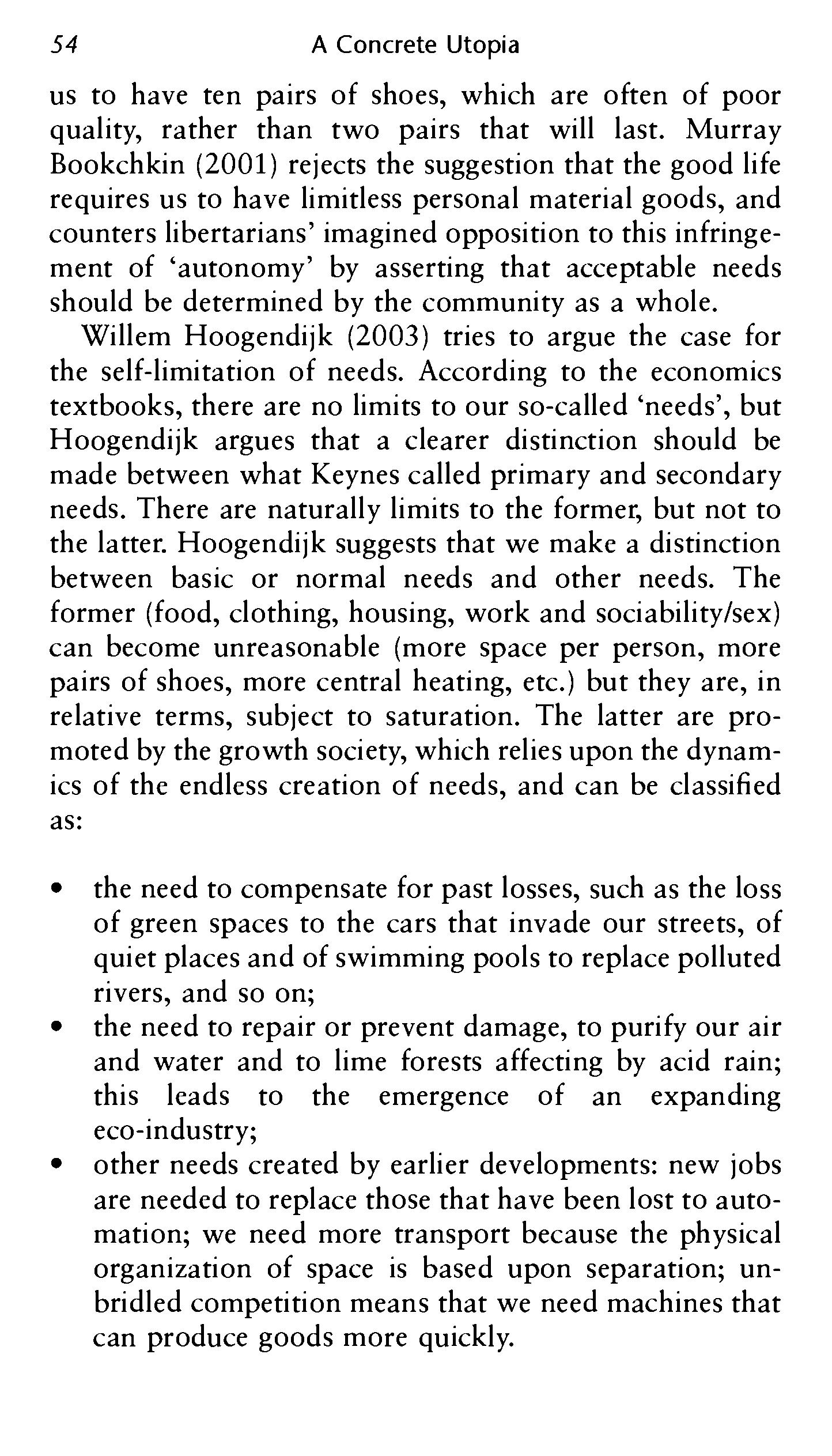
as:
the need to compensate for past losses, such as the loss of green spaces to the cars that invade our streets, of quiet places and of swimming pools to replace polluted rivers, and so on; the need to repair or prevent damage, to purify our air and water and to lime forests affecting by acid rain; this leads to the emergence of an expanding eco-industry; other needs created by earlier developments: new jobs are needed to replace those that have been lost to auto- mation; we need more transport because the physical organization of space is based upon separation; un- bridled competition means that we need machines that can produce goods more quickly.
One of the objectives of the system is to create needs and then to satisfy them by producing goods to mend what has been broken and to compensate and console us for what we have lost.
Reducing growth also means slowing down, and there- fore resisting both the empire of speed and current trends. The recent abolition of the siesta in Spain is symptomatic of the absurdity of the growth society. 'The arbitrary abo- lition of the Siesta in order to bring Spain into line with the working hours of branches of transnational firms (I am thinking here of the Spanish banking system which has adopted European opening hours) is,' remarks Thierry Paquot (2006: 178), 'an act of considerable symbolic vio- lence, and also a counter-productive measure.' And all doctors are indeed agreed that this ancestral practice has beneficial effects.
All in all, it is not a question of making consumers feel guilty in order to convert them to asceticism, but of making them more responsible citizens.
The recipe for de-growth lies in doing more, and doing better, with less. Illich's formula must not be understood in the sense of economic rationalization, as the techno- cratic caricature would have us believe. The dismantling of the Welfare State and the budget cuts that followed has led to the emergence of new forms of management in the public sector, and they are replacing the rationalization of budgetary choices. The goal is now to improve the results of social policy by spending less by using associations (or even the voluntary sector) that can compete in the market for subsidies. The spirit of dc-growth is as far removed as it could be from the obsessional search to make savings of all kinds and from the underlying neo-liberal ideology and its key words (efficiency, performance, excellence, short- term profitability, cost-cutting, flexibility, return on invest- ments, etc.). That leads to destruction of the social fabric. Of course the goal is to consume less of the planet's limited natural resources, but to use them so as to produce an
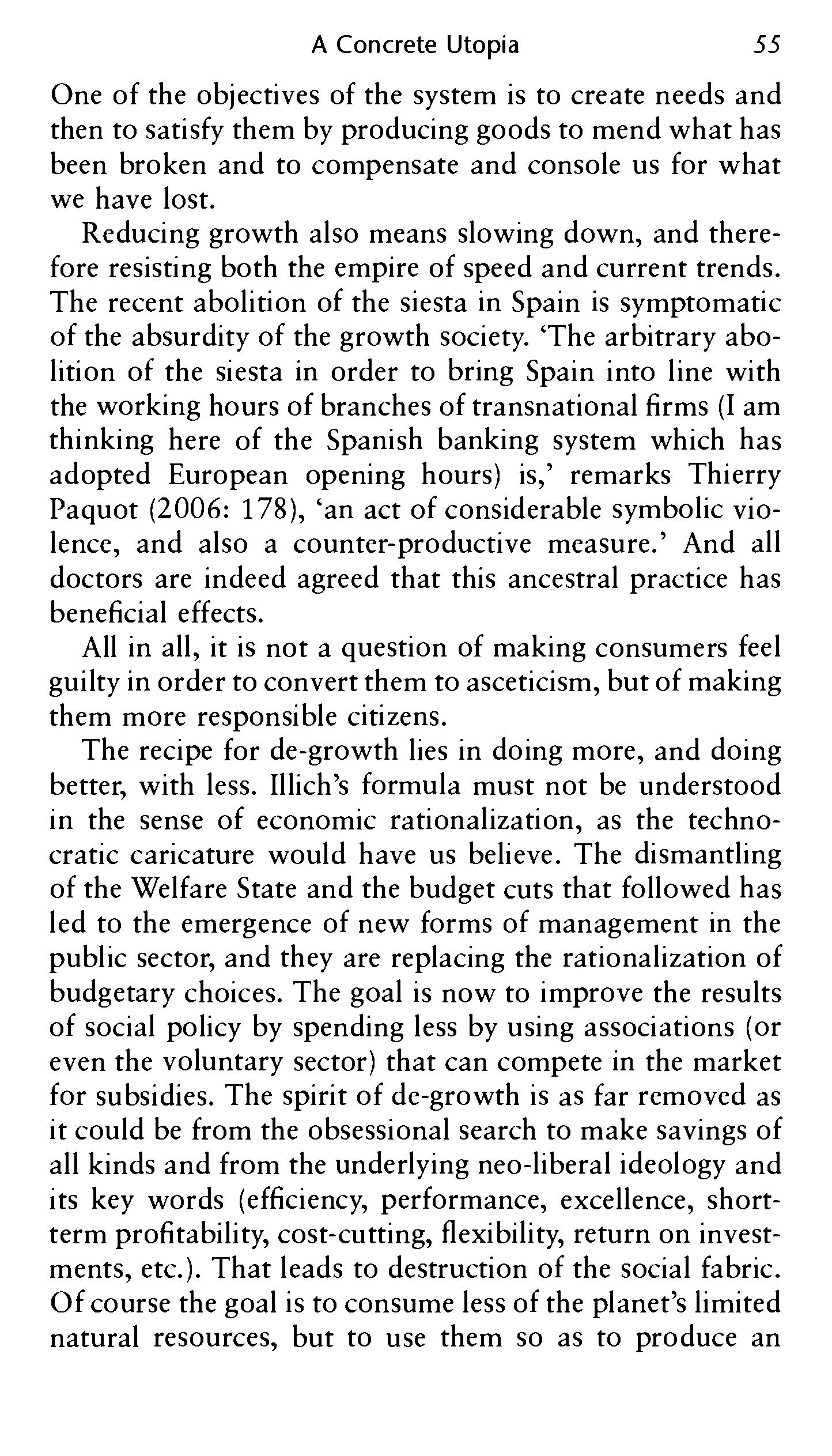
A Concrete Utopia extra-economic surplus; dc-growth is therefore the dia- metrical opposite of the goal of the technocrats.
Does this imply rationing? Some are seriously thinking of rationing where energy and the emission of greenhouse gases are concerned, even if rationing is reminiscent of a wartime economy. But it might well be said that we are involved in a battle for humanity's survival. Lester Brown (2004) notes that in 1942, and faced with a wartime emer- gency, the American economy could convert car plants to produce tanks overnight. Reconverting the same car indus- try to produce microgenerators might represent a similar challenge. In emergency conditions, a democratic country like the United Kingdom was prepared to accept a pro- gramme of blood, sweat and tears. Far from necessarily implying such sacrifices, the ecological conversion of our societies holds out the promise of more joie de vivre, and for today rather than tomorrow: healthier food, more leisure time and more conviviality.
Given that we can reasonably count on an increase in ecological efficiency (greater biocapacity, more productive farmland, fisheries and forests) thanks to better technolo- gies and better management, there will be less need to reduce.'8 We can, in other words, get back to the 'right' ecological footprint (one planet), which means cutting the depletion of natural resources by 30%, by reducing 'final' consumption by 50%. The improvement in our quality of life would be out of all proportion to the measures that are needed.
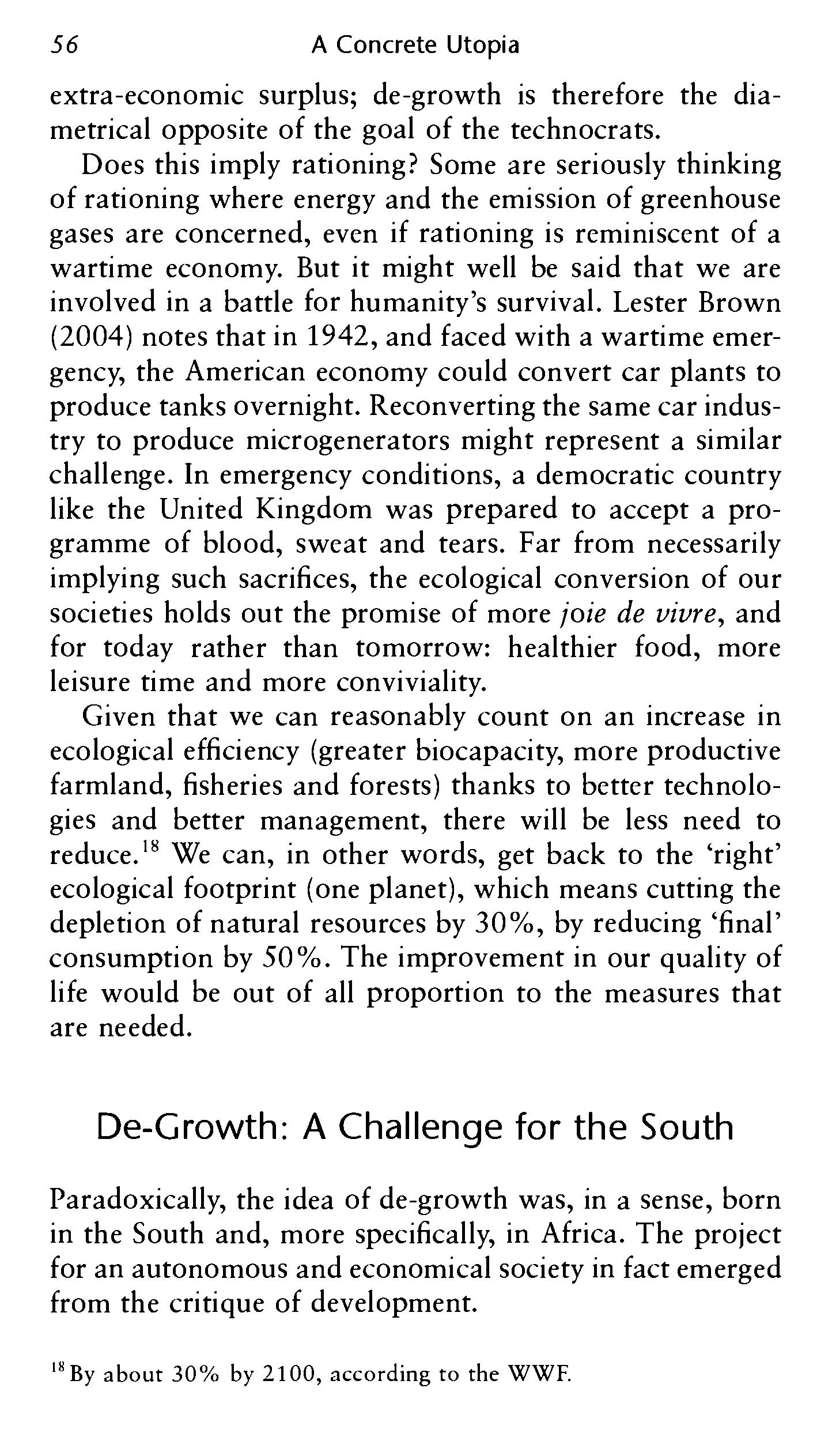
De-G rowth: A Challenge for the South
Paradoxically, the idea of dc-growth was, in a sense, born in the South and, more specifically, in Africa. The project for an autonomous and economical society in fact emerged from the critique of development.
For over forty years, a small anti- or post-developmen- taust 'internationale' has been analysing and denouncing the harmful effect of development in Africa, from Boumé- dienne's Algeria to Nyerere's Kenya (see Sachs 1992). Its critique applies not only to capitalist or ultra-liberal devel- opment, as in Ivory Coast, but also to what is officially known as 'socialist', participatory', 'endogenous', self- reliant or 'popular' development, which has often been implemented or supported by humanist NGOs. Although there have been a few remarkable micro-successes, devel- opment has been a massive failure and what was meant to improve the quality of everyone's life has resulted in cor- ruption, incoherence and structural adjustment plans that have turned poverty into misery.
A critique addressed to the South supplies the historic alternative, namely self-organized societies and vernacular economies (see Latouche 1998). These analyses naturally take an interest in alternative initiatives in the North such as LES (local exchange systems), REPAS (réseaux d'échange des pratiques alternatives et solidaires), Banche dei tempo (individual exchange of services), cooperatives, and so on, but not in a societal alternative in the singular. The fact that the environmental crisis has coincided with the emer- gence of globalization, together with the unexpected - but very relative - success of the critics of development, who seemed for a long time to be preaching in the wilderness, means that we have to look more closely at what this critique implies for the economy and society of the North. The farce of sustainable development in fact concerns both the North and the South, and growth now poses a global threat. Hence the de-growth proposal.
Reducing Africa's ecological footprint (and GDP) is neither necessary nor desirable. But we should not there- fore conclude that a growth society should be built there. De-growth concerns the countries of the South to the extent that they have committed themselves to building growth economies and that de-growth can prevent them from being trapped in the blind alley into which that
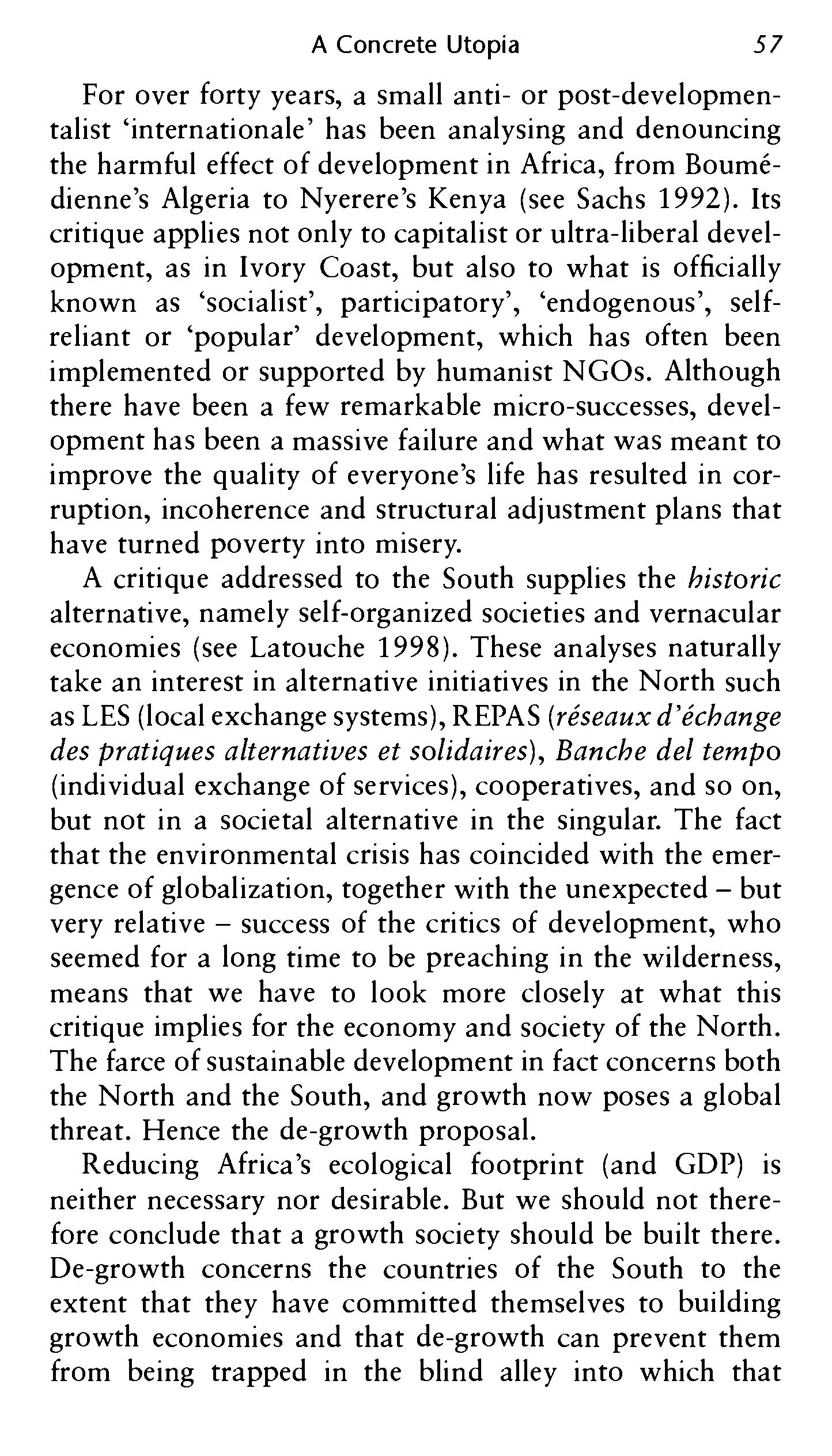
58
A Concrete Utopia adventure is leading them. Far from unreservedly singing the praises of the informal economy, I think that the societies of the South can, if there is still time, 'undevelop' themselves, or in other words avoid the obstacles that prevent them from realizing their full potential. First of all, it is clear that dc-growth in the North is a precondition for the success of any form of alternative in the South. So long as Ethiopia and Somalia are forced to export foodstuffs to feed our animals when famine is raging, and so long as we go on fattening our livestock on soja cattlecake that is produced by burning the Arnazonian forest, we will asphyxiate any attempt at real autonomy
in the South.19
If we dare to implement dc-growth in the South, we can attempt to trigger a spiral moment that will bring us into the orbit of the virtuous circles of the three 'R's. The spiral that leads to dc-growth could be organized around alterna- tive and complementary 'R's, such as Rompre [break], Renew, Rediscovei Reintroduce, Recuperate, and so on. Break away from economic and cultural dependency on the North. Renew contact with the thread of a history that was interrupted by colonization, development and global- ization. Rediscover and reappropriate the cultural identity of the South. Reintroduce specific products that have been forgotten or abandoned, and 'anti-economic' values that are bound up with the past of these countries. Recuperate traditional technologies and skills.
In February 2007, the Italian NGO Chiama l'Africa organized a debate on the theme of 'poverty and de- growth' with some intellectuals from Benin at the Emmaüs Centre in Tohue, near Cotonou, with Albert Tévoédjrè as the keynote speaker. The debate summed up the 'African paradox'.
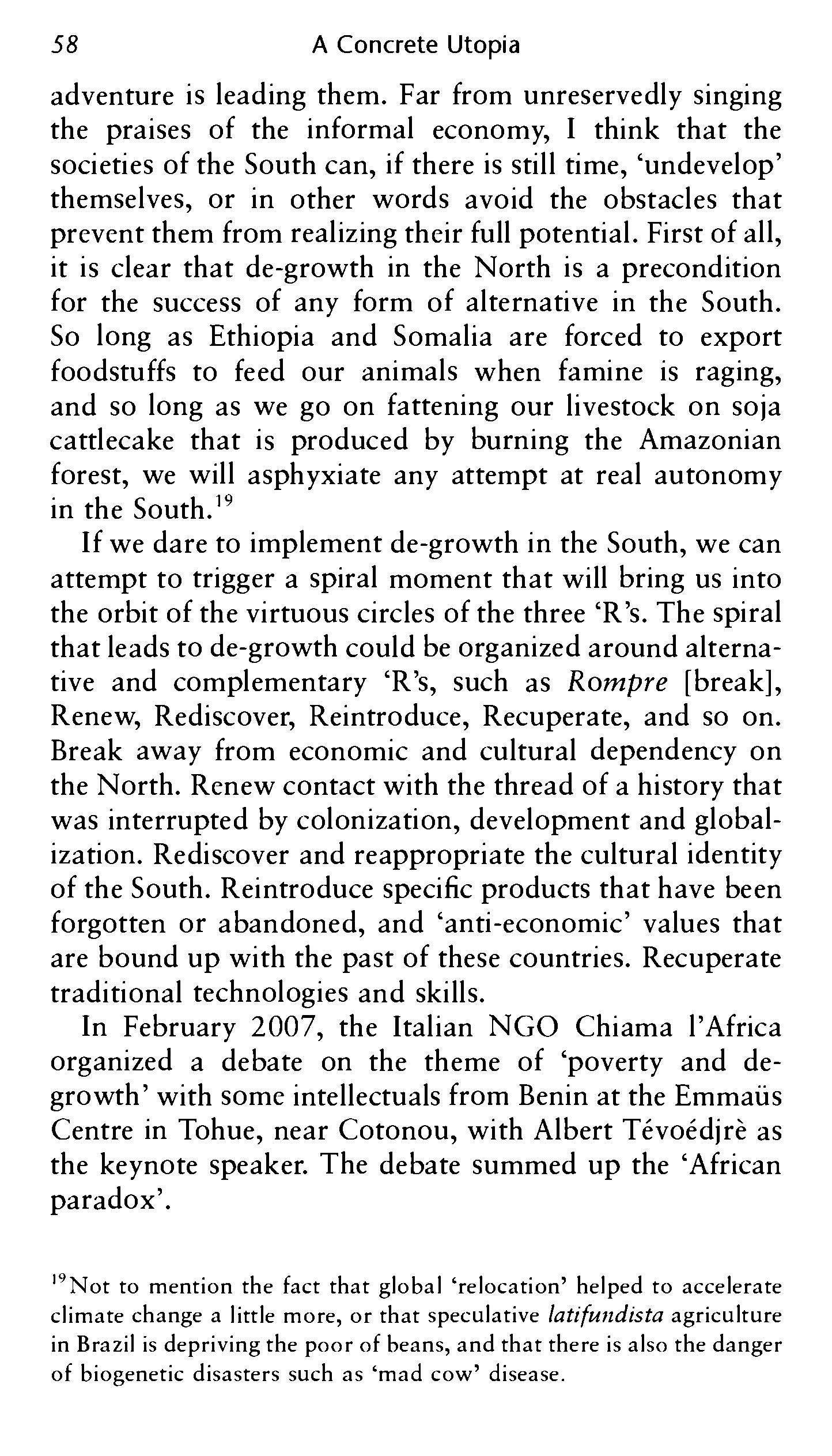
'9Not to mention the fact that global 'relocation' helped to accelerate climate change a little more, or that speculative latifundista agriculture in Brazil is depriving the poor of beans, and that there is also the danger of biogenetic disasters such as 'mad cow' disease.
No one remembers Albert Tévoédjrè. And yet, at the suggestion of Ivan Illich, he published a best-selling book that anticipated the idea of dc-growth in 1978. His Poverty: Wealth of Mankind (Tévoédjrè 1979) criticizes the absur- dity of cultural and industrial mimetism, celebrates sobri- ety, which is part of the African tradition, denounces the excesses of the consumer society, with its deliberate cre- ation of artificial needs, the dehumanization generated by the dominance of cash-based relations, and its destruction of the environment. He advocates, finally, a return to self- sufficiency at the village level.
Now in his late eighties and still in good health, the man has not reneged on his ideas, but they are no longer of any interest to anyone in Africa. Like many African intellectu- als he has, perhaps in vain, devoted his energies to politics, but has never been able to act on his convictions while holding ministerial office.
In L'Autre afrique (Latouche 1998), I analyse how those who are excluded from economic modernity can organize themselves by 'making do'. They provide an example of how a society that is autonomous, economical and sustainable can be built in conditions that are much more precarious than any that might be experienced by dc-growth societies in the North without owing anything, or while owing almost nothing, to the continent's intel- lectual and political elites. This ability not only to survive but also to construct a complete life in the margins of the global market society is based upon three kinds of bricolage: an imaginary bricolage with the proliferation of syncretic cults and sects (even in Muslim countries, with their brotherhoods and dissident groups); techno- economic bricolage, thanks to an ingenious, industrious and entrepreneurial recuperation (as opposed to Western economic rationality, which is based upon engineering, industrial and entrepreneurial rationality); and above all social bricolage, thanks to the invention of neo-clan bonds (resulting from simultaneous membership of a host of associations).
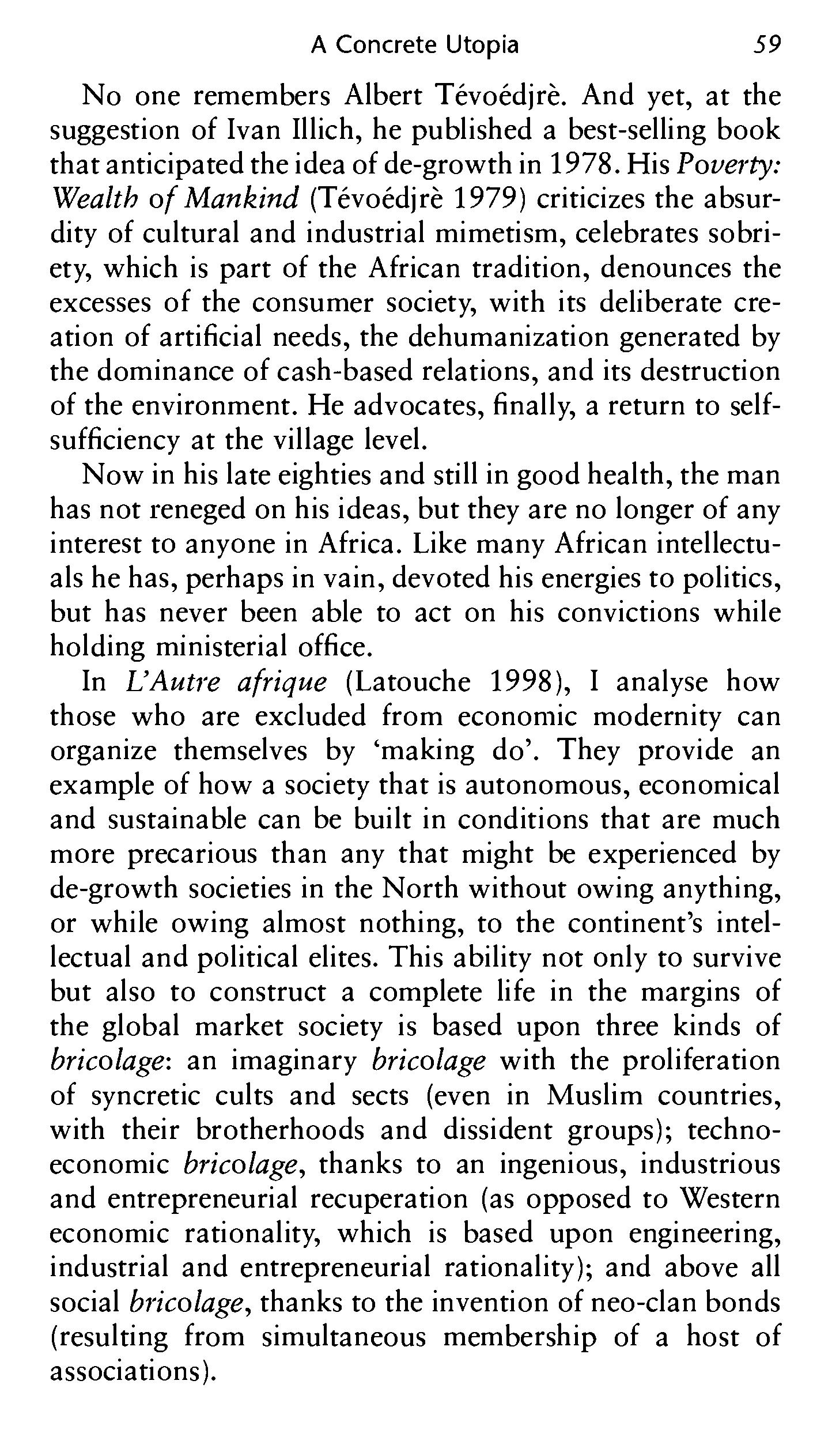
60 A Concrete Utopia
Although this is a real alternative society that has yet to gain recognition or appear on the political and interna- tional stage, it is, however, under constant threat from a triumphant and arrogant globalization (even when it is in crisis). Whilst we have witnessed its surprising 'success', the colonization of the imaginary, which has already cor- rupted 'official Africa', now poses a threat to the other Africa. The invasion of the international media thanks to radio, television, the Internet and mobile phones is having a corrosive effect on the social bond. One has only to think of the young people who want to leave their own coun- tries, which they have come to see as hell, for the artificial paradises of the North, even though they will find that the door is locked against them. The salvage dealers who tri- umphed over European manufactured exports now some- times have to compete with very cheap mass-produced Chinese consumer goods. Whilst those goods are not gen- erating a true individualism, the processes of individuation are successfully undermining the solidarity on which the alternative world was based. Pollution, finally, is no respecter of frontiers and is making a degraded environ- ment more and more unliveable. Like a cancer, a veritable second-hand consumer society, with battered old cars, broken mobile phones and computers undergoing repairs and everything else the West has thrown away, is eating away at Africa's ability to resist. It is to be hoped that the crisis hits the North in time to give the other Africa a chance. A few years ago, old ladies in Benin's villages would say to me: 'When are you French coming back? We've suffered too much since you left.' Nowadays, young people bombard us with other questions: 'Help us get to France. There's no hope for us here.' Tragically, the African paradox is very similar to the Western paradox. As my late friend jean Baudrillard once wrote (2005): 'The only thing that keeps Western culture going is the fact that the rest of the world wants to be part of it.'
If we really want the North's concern for justice to extend beyond the need to reduce its 'ecological footprint',
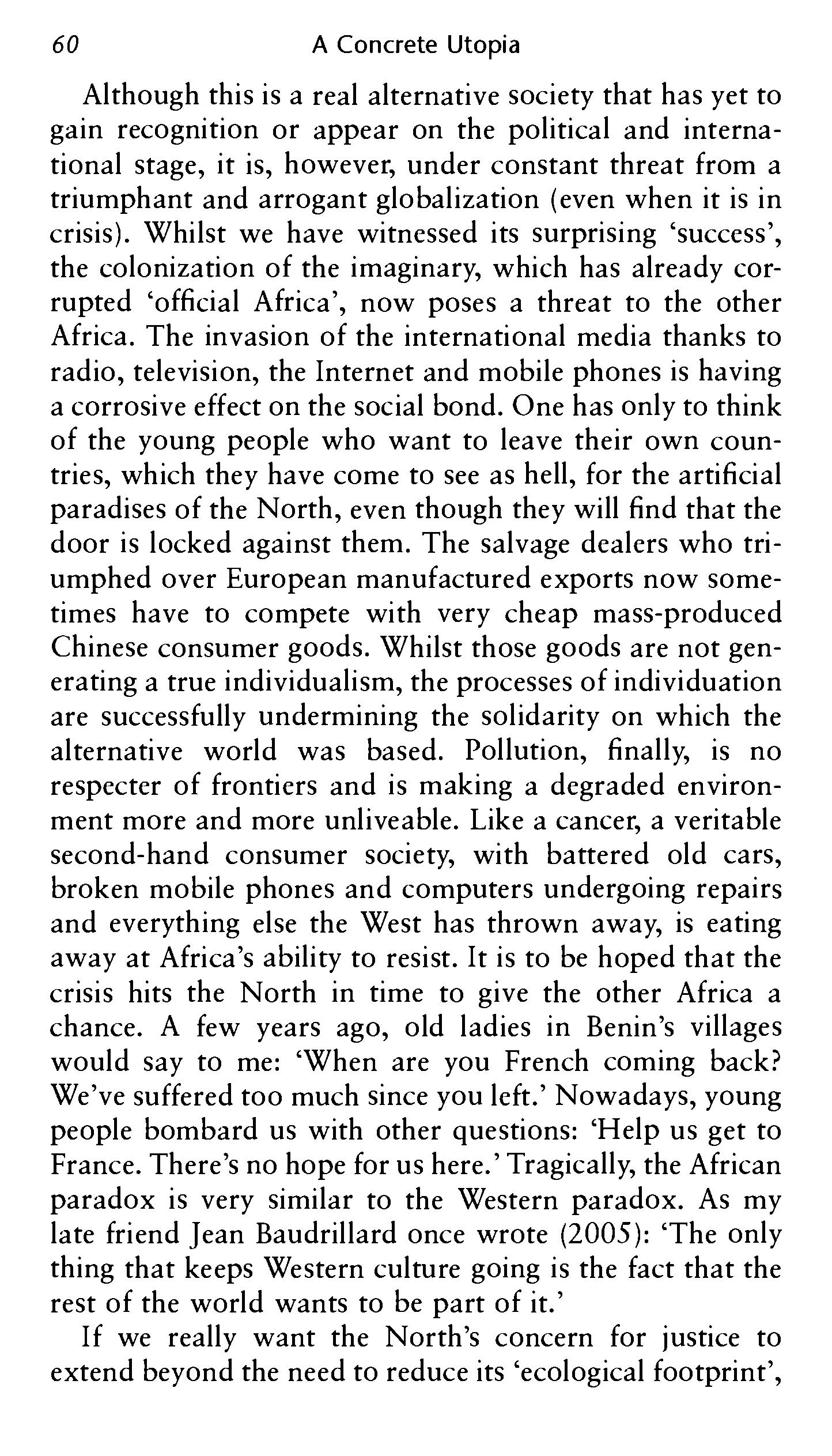
we should perhaps extend its ecological debt to include another 'debt'. Native peoples sometimes remind us that the North has a debt of restitution. Repaying the debt of the South's lost honour (the loss of its plundered heritage is much more problematic) might mean entering into a de-growth partnership with the South.
Conversely, persevering with or, worse still, introducing the logic of growth into the South on the grounds that it will lift these wretched countries Out of the poverty that has been created by growth itself cannot but Westernize them still further. The suggestion that we should 'build schools, health centres, systems that provide water that is fit to drink, and get back to self-sufficiency in food' (Harribey 2004) reflects good intentions on the part of our friends in the anti-globalization movement, but it also reflects the usual ethnocentrism of development. We have two options. We can ask the countries concerned what they want by consulting their governments or organizing opinion poils that will be manipulated by the media. It is obvious what answer we will get. Rather than meeting the 'basic needs' Western paternalism ascribes to them, they will ask for air-conditioning units, mobile phones, refrig- erators and especially cars, along with nuclear power sta- tions, Rafale jets and AMX tanks to keep the politicians happy.. . Or we can listen to this cry from the heart from a Guatemalan peasant leader: 'Leave the poor alone and stop talking to them about development' (Gras 2003: 249). All leaders of popular movements, from Vandana Shiva in India to Emmanuel Ndione in Senegal, say the same thing in different ways. Ultimately, the reason why 'getting back to self-sufficiency in food' is undeniably a matter of urgency in the countries of the South is that they have lost their self-sufficiency. Africa was still self- sufficient until the 1960s, which is when the great develop- ment offensive began. Surely it is the imperialism of colonization, development and globalization that destroyed the self-sufficiency of the countries of the South and that is exacerbating their dependency day by day? Before it was
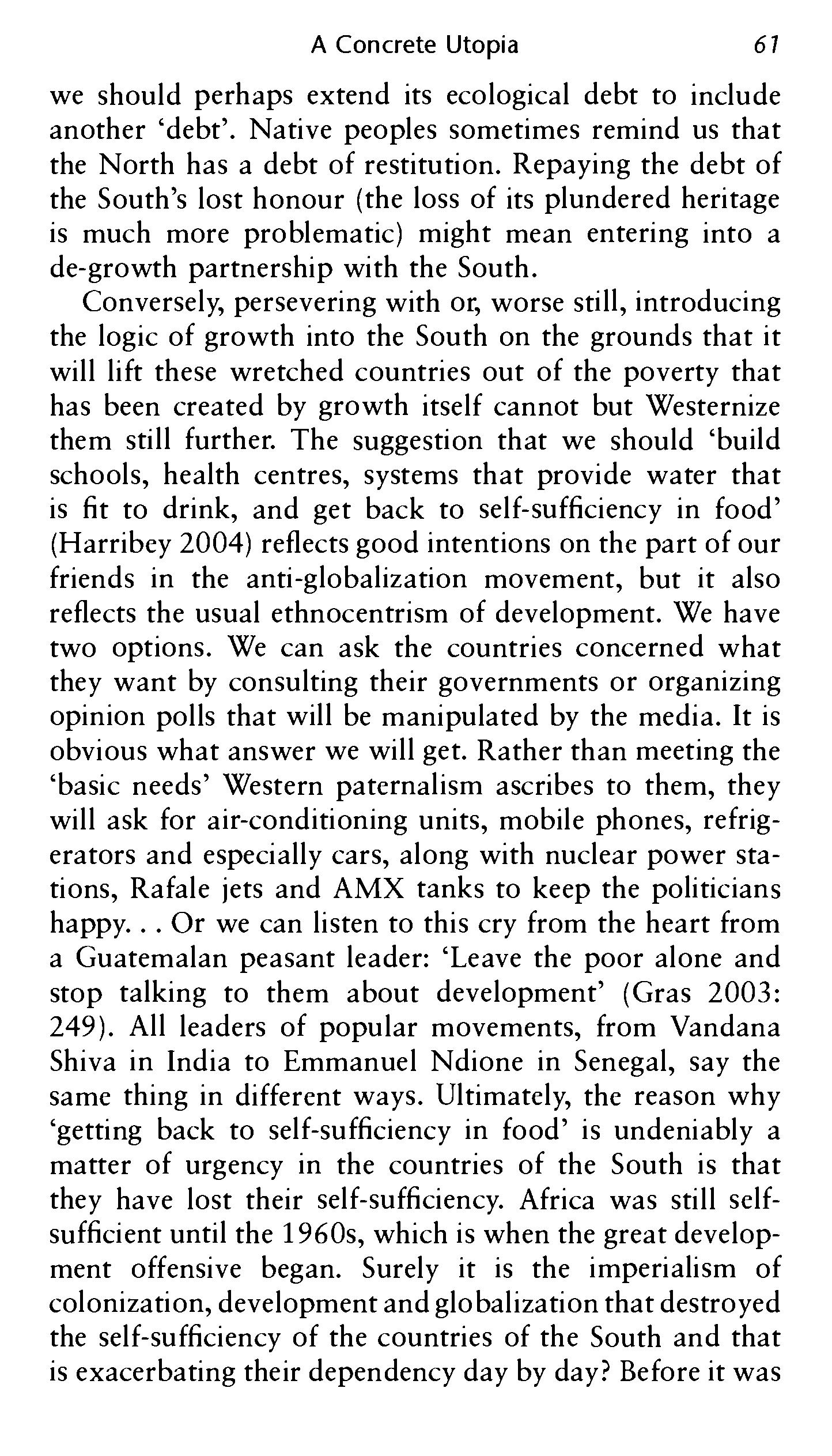
62
A Concrete Utopia so grossly polluted by industrial waste, their water was usually drinkable, with or without taps. As for schools and health centres, can such institutions really promote and defend culture and health? Ivan Illich (1971, 1977) had serious doubts about their relevance to the North. Where the South is concerned, even greater circumspection is
required, as some (though no doubt too few. . .) intellectu- als from those countries are saying. The solicitude of the White Man who worries about dc-growth with the noble aim of coming to their aid is suspect. As Majid Rahnema rightly points out (2003: 268),
What we go on calling aid is no more than spending that is designed to reinforce the structures that generate poverty. On the other hand, the victims who have been robbed of their wealth never receive any aid when they try to distance themselves from the globalized productive system and try to find alternatives that are in keeping with their own aspirations.
And yet the alternative to development, in both the South and the North, cannot be either an impossible return to the past or a uniform dc-growth model that is imposed from on high. For the excluded and those who have been ship-wrecked by development, it has to be a sort of synthesis of traditions that have been lost and a modernity to which they have been denied access. That paradoxical formula is a good summary of the twofold challenge they face. Once their creativity and ingenuity have been freed from the shackles of economism and 'developmentalism', the odds are that their remarkable social inventiveness will be able to meet it. Post-develop- ment, which has to be plural, means looking for forms of collective prosperity that do not put the emphasis on a material well-being that destroys the environment and the social bond. The objective of 'the good life' can take many different forms, depending on the context. The point is, in other words, that we have to reconstruct/rediscover new cultures.
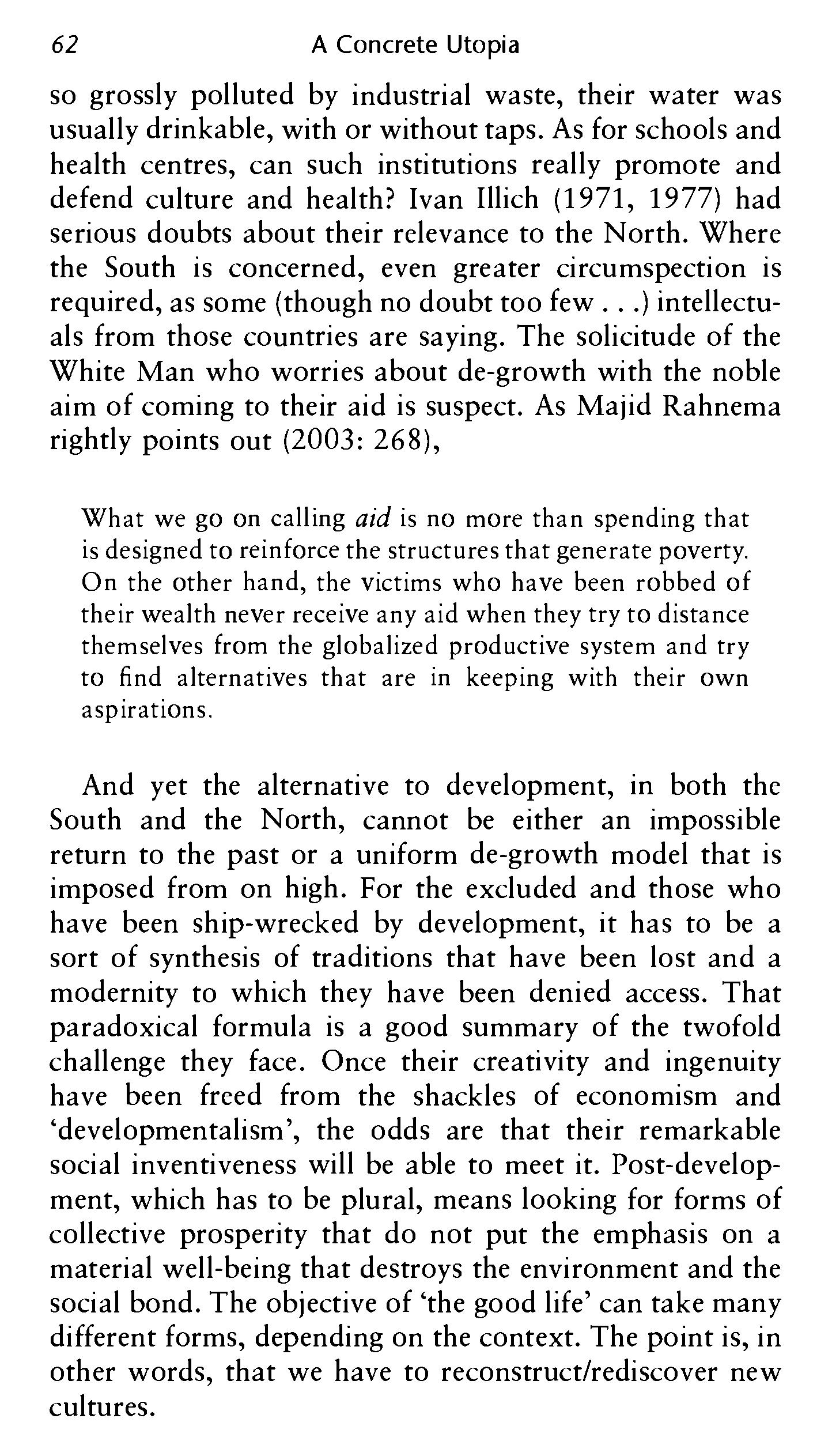
Once again, we are talking about a concrete, fertile utopia, and not a political agenda. Chapter 3 will not present an agenda for building autonomous societies in the South because I take the view that the content of the project must be determined by the populations concerned. Attempt- ing to implement it in the South will certainly come up against many obstacles. 'If you think of a lion, climb a tree,' says the Bantu proverb. Whilst anyone who embarks
upon such a political project in the North risks assassina- tion, even thinking about it in the South means that they will suffer the same fate as Patrice Lumumba, Thomas Sankara or Salvador Allende. According to Pierre Gevaert (2005: 97-8), who has thought a lot about this issue,
Africans, in particular, have yet to become slaves to modern comfort, and should bear in mind the following points:
Do not rely too much on the false wealth of the West, and try to be as autonomous of it as possible.
Replace some foreign paper currencies (CFA francs, dollars, pounds stirling) with a local exchange currency inspired by the LES.
Put a gradual end to monoculture for export and replace it with food crops that are not dependent on inputs from abroad (chemical fertilizers, pesticides, etc.) by using compost that uses every wisp of corn, dung and other organic materials.
When harvests produce a surplus, try to transform the raw materials themselves so as to avoid involvement in unequal markets, and take advantage of the value added generated by their transformations (e.g. sesame or groundnut paste).
Protect your land and soil by surrounding plots with anti-erosion 'mini-ditches'.
Use the sun for cooking. Use solar ovens; a local car- penter can make them for loo euros at most.
Create as many reservoirs and dams as possible to store rainwater.
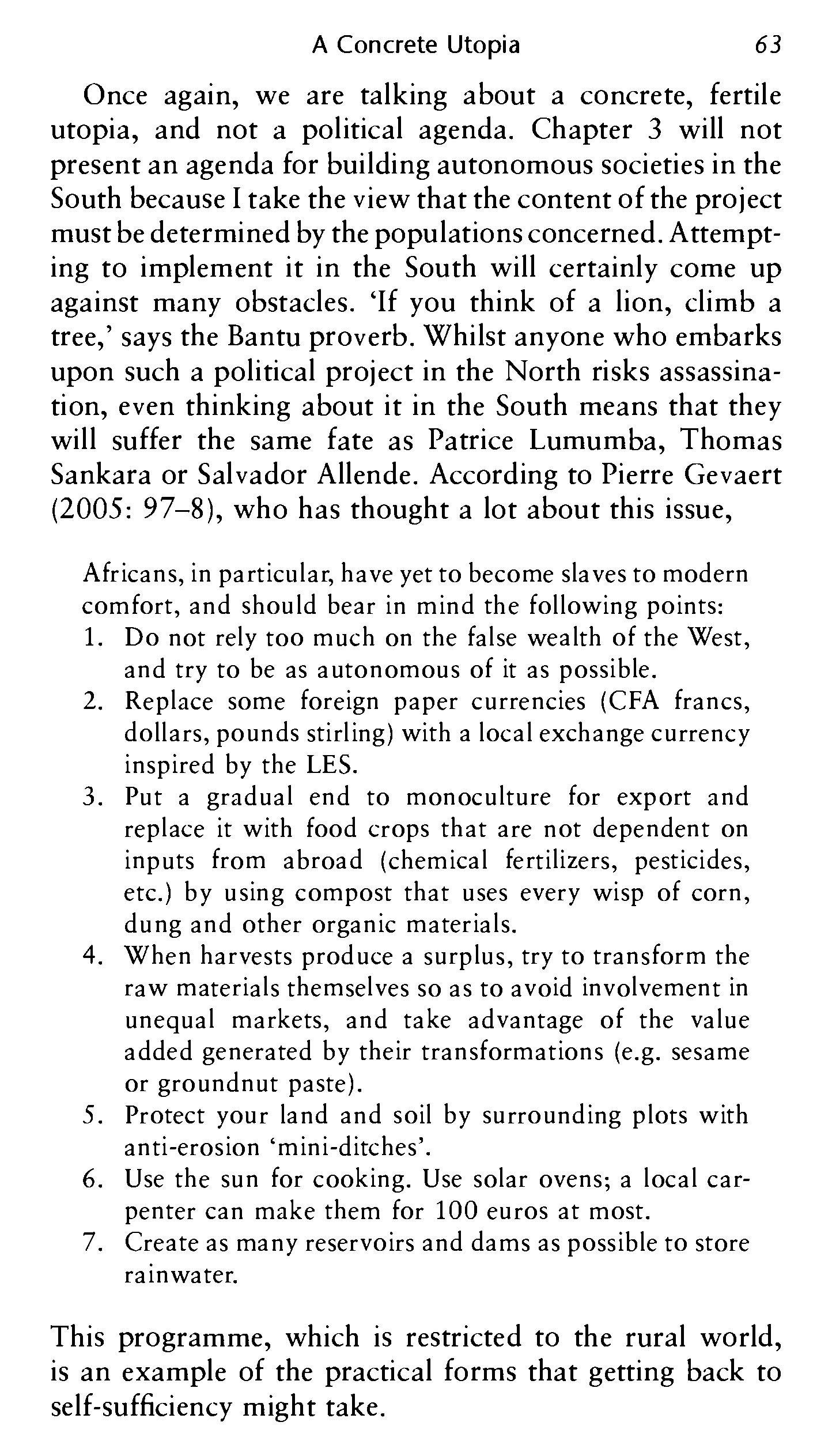
This programme, which is restricted to the rural world, is an example of the practical forms that getting back to self-sufficiency might take.
64 A Concrete Utopia
And what about China? This question always comes up in discussions of de-growth. It is more unusual for someone to ask 'And what about India?' or 'What about Brazil?' It is clear that China's economic growth (and that of India) raises a global problem. China is on its way to becoming the planet's biggest pollutei even though it is far from being the biggest in relative terms. In 2004, its per capita ecological footprint corresponded to just one planet and was still six times smaller than that of the United States. (In the summer of 2007, China became the world's biggest source of greenhouse gases.) China is already the work- shop of the world. It would be immoral, and very difficult, to impose anything on the Chinese against their will. That the country's rising middle class (between 100 and 200 million people after all) should aspire to having their own cars and a share in the unbridled consumerism of the West is quite understandable, and all the less reprehensible in that we are largely responsible for it. Volkswagen and General Motors expect to be producing 3 million vehicles per year in China in years to come and Peugeot is investing on a huge scale so as not to be left behind. China does of course have its own car industry and supplies the home market (and to some extent the export market) by copying foreign marques. Whilst we can imagine what a happy society would look like, we ourselves have yet to enter a society that is both self-sufficient and sustainable, and, by definition frugal in material terms.
Be that as it may, the fate of the world and of humanity will largely be determined by the decisions taken by the Chinese leadership. The fact that they are aware of present ecological disasters and of the very real threats that hang over their future (and ours), and that they know that the ecological cost of growth will cancel out or exceed its benefits in terms of the ecological balance-sheet, together with an ancient tradition of wisdom that is far removed from the West's rationality and will to power, suggests that they will not rush into the blind alley that we find ourselves in, with almost no way Out. According to the
